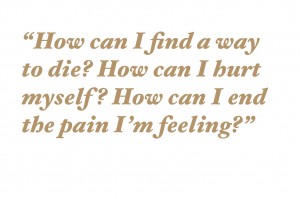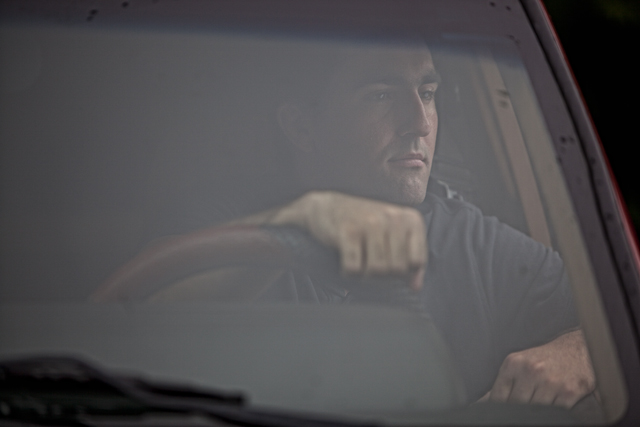Gordon
One small step from death, Gordon chose life.
Standing on a stool, drunk, with a noose around his neck, something inside of him stilled his soul and he paused. Thirty minutes later he had removed the noose from his neck and survived. He would make the attempt two more times before emerging from his personal torment.
What he describes as “creeping thoughts” haunted Gordon from his early teens. “The best way that I can describe my depression is that my brain hates who I am, either through bad wiring or misfiring neurons, it hates me. I describe it almost like someone who has schizophrenia. I don’t hear voices but I have thoughts that arise from some deep dark place.”
 Unable to relate to people his age, he coped by withdrawing, spending hours alone, sleeping, and thinking about death, dying, suicide and hopelessness. Eventually diagnosed with depression, Gordon discovered a maternal family line of mental illness leading straight to him. Her mother suffered from depression and in one difficult episode, the family rallied around her and took her to stay with her parents. On that trip his grandfather confided that he had suffered from what he termed sadness and was finally diagnosed with depression when he was in his 60s. He further learned that his great-grandmother had been institutionalized in an asylum. “So in terms of the genetic lottery, I didn’t luck out in terms of the mental side. Such is life,” he stated in a matter of fact observation.
Unable to relate to people his age, he coped by withdrawing, spending hours alone, sleeping, and thinking about death, dying, suicide and hopelessness. Eventually diagnosed with depression, Gordon discovered a maternal family line of mental illness leading straight to him. Her mother suffered from depression and in one difficult episode, the family rallied around her and took her to stay with her parents. On that trip his grandfather confided that he had suffered from what he termed sadness and was finally diagnosed with depression when he was in his 60s. He further learned that his great-grandmother had been institutionalized in an asylum. “So in terms of the genetic lottery, I didn’t luck out in terms of the mental side. Such is life,” he stated in a matter of fact observation.
Anything could trigger his depression—a bad test score would debilitate him for weeks. He wasn’t just down, he said, but out. “I would get down for a prolonged period of time and those periods got longer and longer and longer and the triggers that caused those bouts of depression got more varied, anything could set me off. Anything remotely negative could send me into a spiral.”
 All this time, suicide beckoned. Instead of looking for ways to improve his scores he would think of ways to die. “How can I find a way to die? How can I hurt myself? How can I end the pain I’m feeling?” he asked, and then described a black ball in his chest where he stored his pain. “I put every thought, every bad idea that I ever had, every suicidal urge and tendency into that ball and it just got denser and denser and heavier and heavier and that’s where I would carry things around.”
All this time, suicide beckoned. Instead of looking for ways to improve his scores he would think of ways to die. “How can I find a way to die? How can I hurt myself? How can I end the pain I’m feeling?” he asked, and then described a black ball in his chest where he stored his pain. “I put every thought, every bad idea that I ever had, every suicidal urge and tendency into that ball and it just got denser and denser and heavier and heavier and that’s where I would carry things around.”
Finally, a year ago, the weight of that despair was overwhelming and he made the first attempt on his life. He had recently begun college and had a breakdown. His mother came, took him to the emergency room where a doctor finally diagnosed his condition and prescribed antidepressants. A couple of weeks later, walking across campus, he froze. It was, he said, the first time he could remember that he wasn’t thinking about harming himself. After a few months, he made the mistake of believing that he was in control and no longer needed the medicine. He stopped taking them. Soon afterwards he was standing on that stool, one step away from death.
“You know, my whole life I had been thinking about killing myself and now I’m at this point, this precipice where I am meant to die and I was happy about it, I was glad, I was excited. But I couldn’t do it. I was petrified of stepping off that stool.” He made a third and final attempt by taking a massive quantity of medications. When he finally awoke, he said he was oddly scared for his life. He broke down, called his parents and was finally able to shed the black ball he carried in his chest.
“Well, the place I am today is 180 degrees from where I was. I feel like I have a passion for life again and it took a lot of therapy and a lot of hospitalization and a lot of time with friends and family members and just talking about what I go through on a daily basis. I believe that I will always have depression. The thing is, is that now I feel like I’m not powerless over it. When I realized how close I came to dying and to really giving up my life and the pain I would cause everyone else that knew me. That was a wake-up call that I had to find some way to get better, and that I have,” he said, noting that a combination of therapy and medications have kept him stable.
If he could knock his younger self on the head and have a conversation with him, he said he would tell him to get help, talk to his family, talk to anybody. “Stay on your meds, they’ve been properly prescribed to you for a reason. Use all the tools you possibly can to lift yourself out of this so you can start living life and enjoying it again.”
A senior in college majoring in psychology, Gordon speaks openly about his illness with a confidence that belies his troubled journey. He hopes sharing his experience will benefit another young person struggling with demons they don’t understand and encourage them to seek help. It is a path he knows well, but with knowledge and experience, he actually looks forward to each new day. A hard-won attitude forged at the brink of death.
His future? Graduate school with an emphasis on adolescent therapy: “My goal is to start a group practice that focuses predominantly on adolescents who need counseling services.”

Depression is so misunderstood and under-diagnosed. His story is instructive and inspiring. Sending love.
“His future? Graduate school with an emphasis on adolescent therapy: “My goal is to start a group practice that focuses predominantly on adolescents who need counseling services.””
And the life he saves, through that counseling service, may save the world…
What an incredible young man for sharing his story and wanting to help others – and so eloquently written.
EXCELLENT!! Thank you for telling this mans story!
I also spent years suffering from depression when I was young. Not until I got so bad and was hospitalized did I find the help that I so needed. I wasted so much of my young years because of ignorance about depression. Wish I had known what was wrong with me and that there was medication for it. I felt I was stuck between not being able to live and not being able to die. A deep dark place I never want to see again. I take my meds faithfully and through counseling I learned the signs of slipping and the tools to combat it. If I were younger I would want to do what this young man wants to do, help others. I do what I can when I see someone who has this and might not recognize it. I believe my son inferior this from me but he won’t listen to me when I try to help him.
Thank you for being so honest Ann and sharing your own experience. And please don’t be afraid to reach out for help for your son, there are many resources listed here on the resource page that offer great services.